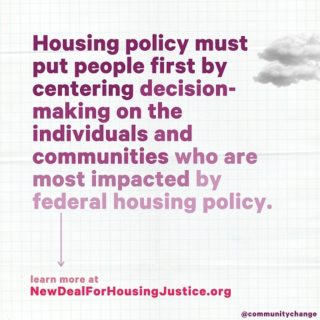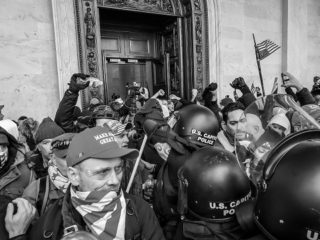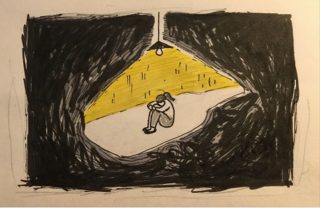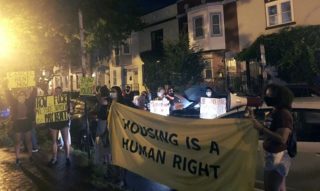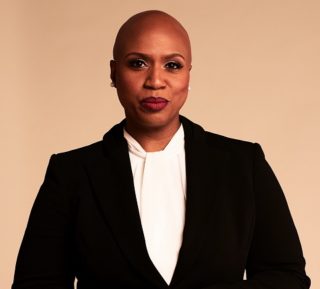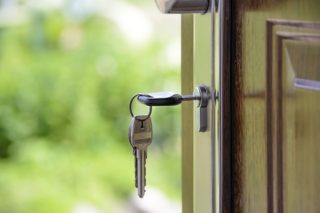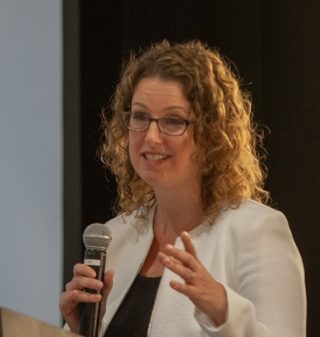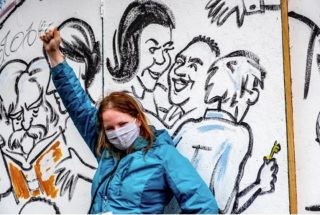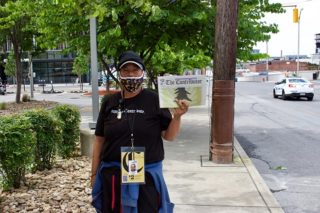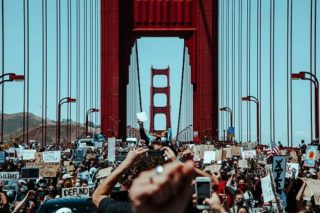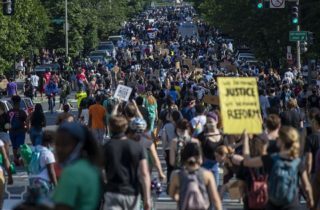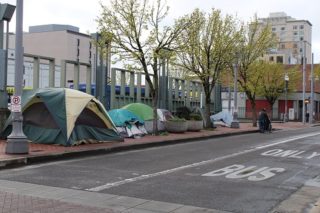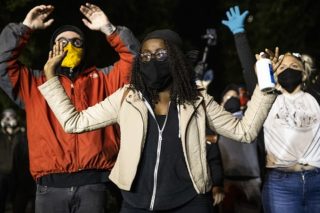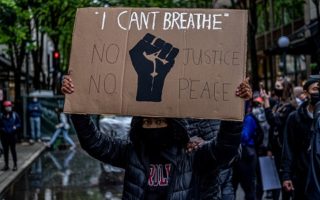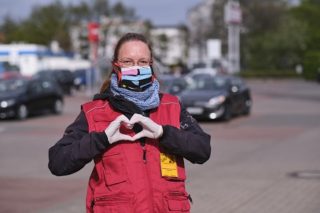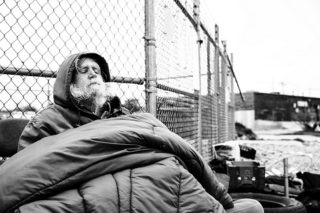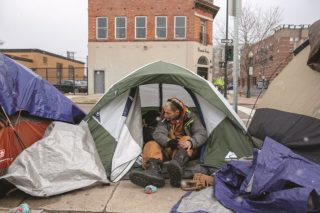Songs we love: Curbside Chronicle vendors shout out the tunes they hold close alongside top-tier musicians
Who doesn’t have a song that’s made a special impact on their life? The Curbside Chronicle reached out to musicians from across the US, as well as a few of their own street paper vendors, to weigh in on the tracks that have changed the way they look at the world.
Why centering lived experience is vital for the future of housing policy-making in the US
In the second of a series of columns about the Housing Playbook initiative to influence policy direction in the US around housing and homelessness by advocacy group Community Change, Zella Knight, an LA County housing commissioner, writes about how those with experience of the system are integral to changing it.
Grow your own way: Inside The Curbside Chronicle’s flower shop
Recently, the long gestating flower shop project of Oklahoma City street paper The Curbside Chronicle finally opened. Here, we take an inside look at the opening day of Curbside Flowers, in downtown Oklahoma City, which provides people transitioning out of homelessness a workplace for their blossoming talents — one bouquet at a time.
Triple Grand Slam winning tennis star Naomi Osaka: “The way I see it, I’m not half anything – I feel both Japanese and Haitian fully”
Tennis player Naomi Osaka rose to the summit of her sport by the age of 23. The three-time Grand Slam winner, who is Japanese-Haitian-American, drew particular attention last year when she wore masks emblazoned with the names of Black victims of police violence during the US Open, all while winning the tournament. In this wide-ranging interview during her preparations for the ongoing Australian Open, she spoke to INSP about her heritage, activism and using her platform for good.
Housing for the future: Andreanecia M. Morris on how the Housing Playbook Project will shape government’s responsibility to provide a home to those who need it
In this Q&A, housing advocate and expert Andreanecia M. Morris talks with Community Change communications fellow Darryl Lorenzo Wellington about the US housing crisis and recommendations for the new administration and Congress as part of the Housing Playbook Project.
The woman behind StreetWise podcast Where I Stay
Chicago street paper StreetWise and digital storytelling organisation Rivet recently collaborated to produce Where I Stay, a serialised documentary exploring “invisible homelessness”, housing instability and economic injustice in the United States. It centres around Angelica, who was kicked out of her home at age 12 due to family dynamics, but never lived on the street. Prisons, Vegas condos, the living room of a drug queenpin and an inpatient facility for adolescents all followed. In this series of standalone articles to support the podcast, StreetWise meets Angelica and speaks with local experts on the subject of youth homelessness.
Washington DC street paper vendors on disruption caused by Trump loyalists at Capitol riot
Trump’s rallies and actions in general have caused havoc to those living on the streets of Washington DC, whether it’s setting police and national guard troops on peaceful protestors last summer, or inciting riots at a rally last week as the US Senate moved to validate the election of Joe Biden as the next President. Vendors reflect on the chaos caused.
Combatting social isolation during the pandemic
During the course of the last year, COVID-19 has grown from an invisible threat to a pervasive international health emergency. The virus has also impacted mental health and sparked instances of relapse. Oklahoma City street paper The Curbside Chronicle spoke with those who’ve struggled with feeling alone and those working the frontlines of mental health to shine a light on the dark side of social isolation and discover some hope.
“To those we hold in high esteem”: Street Roots vendor Rick Davis remembers those who have been lost on the street
Rick Davis, a longtime vendor of Portland’s Street Roots, this year set about creating a dedication wall to mark Homeless Persons’ Memorial Day and all those who have died on the streets.
“The system is failing all the families that really need it”: How the threat of eviction has perpetuated health inequity and racial injustice during the pandemic
Black and Hispanic communities have faced inequities and injustices based on race even before the COVID-19 pandemic. Now that stimulus packages and eviction moratoriums are running out or expiring, futures are even more uncertain for these communities, who have also been hit hardest with higher job or income loss than white communities, says health and housing law expert Emily A. Benfer.
“I see opportunities for solutions”: The connections between food waste, homelessness, and COVID-19
Food waste and homelessness are often seen as two separate issues. However, there are many organizations across the United States working on solutions to both problems at once. Even with the difficulties of COVID-19, organizations are finding ways to help support the larger numbers of people needing food support by recovering significant amounts of food that would be wasted through shutdowns.
Rep. Ayanna Pressley asks marginalized communities to remember “our greatness is older than our oppression”
The first black woman to represent the state of Massachusetts in the US Congress, Ayanna Pressley, talks to INSP about racism as a public health crisis, housing and homelessness, the intersection of racial and housing justice, and the hope people with marginalized identities can have, even as the November election approaches in a hurricane of violence, corruption and upheaval.
An emerging battleground: Housing in the 2020 presidential election
Issues related to poverty and homelessness have long been pushed to the periphery of presidential elections. But with the housing crisis on course to be the most severe in history, they are of vital importance to a record number of Americans. The two candidates offer vastly different views of how to address homelessness in the United States. Trump’s record and statements show he is skeptical of government fiscal intervention and the housing-first model and supports a deregulatory approach, whereas Biden advocates for the federal government to play a much larger role through greater funding and rulemaking. Street Sense outlines the candidates’ platforms.
US Congresswoman Ilhan Omar: “We must be courageous in demands for investment in making our communities whole”
Since her election to the US House of Representatives, Ilhan Omar has made a name for herself as one of the key progressive voices in American politics while often facing xenophobic, racist, and sexist vitriol from the right. She spoke to INSP about the major issues facing modern America, from her work as a leading advocate for affordable housing reform to her commitment to a Green New Deal.
“At 15 years old, I was thrown from living barely above the poverty line to not having a home”: How the climate emergency exacerbates homelessness
In 2007, a flash flood ripped through Kathryn McKelvey’s home in a rural Oregon town, leaving it utterly destroyed and her family homeless. As fires now consume the western United States, McKelvey, a tireless homeless advocate, shows through her personal story how the climate crisis – and the increasing frequency and destructiveness of the natural disasters that come with it – is causing more and more people to fall into poverty and homelessness, with no safety net.
Housing is going to be an election issue — most Americans want the same thing
As Americans ready themselves for the November presidential election, housing may be more important than it has been in any recent election. In this op-ed for the INSP North America bureau, leaders from social action organisations – Community Change, Policy Link and Race Forward – lay out why this will be the case, and how housing is a pivot issue around a number of other key areas on voters’ minds, from racial justice to the economy.
US housing advocate Diane Yentel on housing in America: Where do we go from here?
Diane Yentel is the President and CEO of the National Low Income Housing Coalition, a membership organization dedicated solely to achieving socially just public policy that ensures people with the lowest incomes in the United States have affordable and decent homes. One of America’s leading voices on housing and homelessness, she spoke with INSP North America’s Israel Bayer about the housing crisis in America, what’s at stake in the upcoming Presidential election, the intersection of racial and climate justice with housing, and what readers can do about it.
Paused by a pandemic: A STREETZine vendor’s story
Vietnam veteran and STREETZine vendor Gary Keeton recalls his experiences of being forced to halt selling the Dallas street paper due to the COVID-19 outbreak and how his association with the magazine has dramatically improved his life.
Real Change vendors were caught at the outset of the pandemic. Now they’re back
King County, home to Seattle’s Real Change, was a key area in the beginning of the COVID-19 outbreak. Now, some normality is returning for its street paper vendors. Here are some of their stories.
Tales from quarantine from Nashville street paper vendors
In this article, The Contributor catches up with several of its street paper vendors to find out how their lives and sales have been affected since COVID-19 hit. Although The Contributor has been able to continue printing physical copies of the paper during the pandemic, its vendors have had to adapt in order to maintain both their sales and their relationships with customers in a way that is safe for everyone.
Street Spirit captures San Francisco in protest
Photographer Kit Castagne provided a series of powerful photos of anti-racism protests in San Francisco, California, for publication in Berkeley street paper Street Spirit.
Response to protests upends daily life for homeless people in downtown Washington DC
As near-constant Black Lives Matter protests have become a fixture near the White House, people experiencing homelessness in the area are finding themselves caught in the crossfire between demonstrators and law enforcement.
Police response to protests shakes houseless Portlanders
The discord of protests is “quite an ordeal” for people living outside, including those with PTSD who are troubled by loud noises. Street Roots reports on how Portland’s homeless community has reacted to the protests.
Struck by a rubber bullet: Street Roots staffer describes her experience as a Black woman at a Portland protest
“Surviving police brutality is a different type of trauma known to an endless number of Black people,” writes Street Roots staffer Sophie Maziraga.
Black lives matter: Protest movement against racism, oppression and police brutality sweeps across America
Since the death of George Floyd, a young black man killed by a white police officer as his colleagues stood idly by, protests have sprung up across the US and other parts of the world calling for an end to systemic racial injustices and police brutality. American street papers were present at many of those protests.
As coronavirus lockdowns ease, street paper vendors return
With lockdown restrictions being pulled back in some areas, and the new normal of social distancing takes form, street paper vendors are beginning to return to the pitches they have been absent from as the COVID-19 pandemic has spread. INSP spoke to some of the publications who have begun street selling again about how they prepared their vendors and how they have managed.
Getting by: Homeless during a pandemic in Oklahoma city
Throughout March and April, the world changed. COVID-19 turned something as simple as a trip to the park into a memory. Yes, it’s been a struggle. But when so much of the advice hinges on staying indoors and staying isolated, what does it mean if you’re experiencing homelessness? How do you shelter in place when you have no home? We have received dispatches from different parts of the world on this subject. Today: Oklahoma City, home of The Curbside Chronicle.
Sheltering in place while unhoused in Denver
While downtown Denver remains empty, those experiencing homelessness have struggled to find limited shelter, forcing some to create their own “city within the city”.





